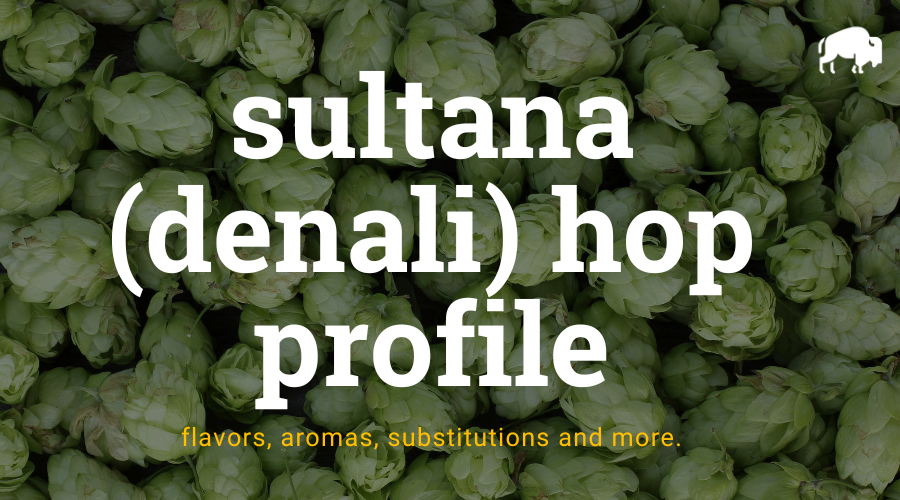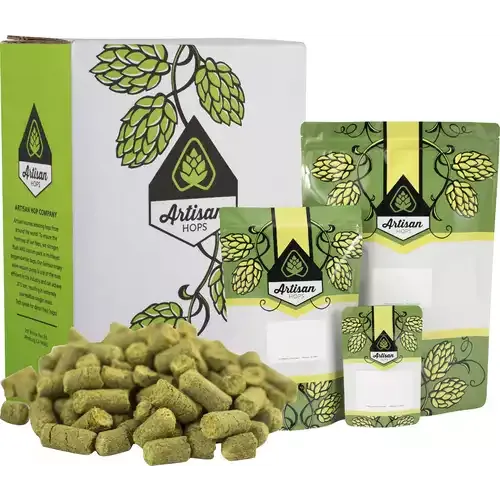
The Sultana hop, released initially as Denali in 2016 and renamed in 2019, has a genetic origin of 50% Nugget, 25% Zeus, and 25% USDA 19058m. This hop was developed by the Hopsteiner Breeding Program and released in 2006 as a cross between Nugget, Zeus, and a USDA 19058 male.
Sultana, sometimes called Nuggetzilla, is a dual-purpose hop known for its strong pineapple, pine, and citrus aromas, often perceived as lemon. Additionally, this hop can come across as spicy, making it versatile for various brewing styles. Its high total oil content enhances its overall flavor and aroma profile.
Sultana hop work well in IPAs, Pale Ales, Saisons, Pilsners, and American Wheat Beers. The combination of pineapple, citrus, and pine flavors from Sultana complements these beer styles, adding unique and memorable characteristics to each brew.
| Usage: | Dual-Purpose |
| Country of Origin: | United States |
| Hop Growers Code: | SUL 06277 |
Where To Buy Sultana (Denali) Hops
Sultana (Denali) Flavor And Aroma
Sultana (Denali) is a dual-purpose hop that is often described to have the following aroma characteristics:

pineapple, tropical

citrus, lemon

pine
Sultana (Denali) Hop Oil Breakdown
Hop oils can vary from year to year and farm to farm but based on our research, here are the typical values we have seen reported. This information comes from various hop farms, The Hop Aroma Compendium, and For The Love Of Hops.
| Alpha Acid % (AA) Alpha acids are what is isomerized when boiling to create bitterness in beer. | 13% – 16% |
| Beta Acid % Beta acids are what give hops their more aroma and flavor compounds. | 3.5% – 7% |
| Alpha-Beta Ratio This ratio of alpha acids to beta acids determines how quickly bitterness fades during aging. Lower ratios are common for aromatic varieties. | 2:1 – 5:1 |
| Co-Humulone as a % of Alpha Higher numbers are said to impart a harsher bitterness. | 22% – 26% |
| Total Oils (mL/100g) With more total oils, typically comes a more complex hop profile but these are highly volatile compounds. | 2.5mL – 4.5mL |
| Myrcene green, resinous | 54% – 55% |
| Humulene woody, piney | 15% – 17% |
| Caryophyllene woody | 5% – 7% |
| Farnesene floral | 0% – 1% |
| Other Oils: Includes beta-ionine, beta-pinene, limonene, linalool, geranoil & selinene | 20% – 26% |
| Hop Storage Index (HSI) The HSI indicates the percent of alpha and beta acids lost after 6 months of storage at room temperature (68°F or 20°C). | Data Not Available |
| Hop Storage Index (HSI) Rating | Data Not Available |
Sultana (Denali) Hop Substitutions
Replacing one hop for another is seldom straightforward but sometimes you don’t have the right hop or the right quantity of hops for the beer you want to make. For those situations, we have made a comprehensive list of hops to substitute on brew day.
These substitutions aren’t perfect as hop chemistry is pretty complex.
We wanted to make this list of substitutions with varietals that are easy to find when possible. For Sultana (Denali), we recommend substituting with the following hops:
Beer Styles
For the most part, any hop could have a place in just about any beer style. Based on popular beers, historical usage, and our own preferences, we would recommend using Sultana (Denali) for IPA, New England IPA, Pale Ale, Wheat Beer, Golden Ale. That being said, experiment and see what works best for you.
References
https://www.hopslist.com/
https://www.ars.usda.gov/
https://www.brewersassociation.org/
https://www.barthhaasx.com/
https://www.yakimachief.com/
Hieronymus, Stan. For The Love of Hops. Brewers Publications, 2012
The Hop Aroma Compendium. 2012


